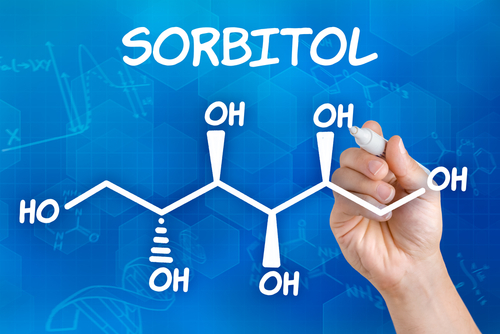Is Sorbitol Bad For You?
Also Known As: glucitol
Short answer
Sorbitol is not harmful is moderation. In fact, it is often used as a good sugar substitute for diabetics.
More beneficial to your health than not. However, harmful qualities are most likely associated and shouldn't be overlooked.
View Full Grading System
Category 'A'
Very healthy and numerous health benefits. Side effects are rare. Things rated an 'A+' are typically necessary for survival (for example, water).
Very healthy and numerous health benefits. A few harmful qualities may be associated, but only under certain circumstances such as an allergic reaction.
Very healthy and numerous health benefits. Harmful qualities may be associated, but aren't usually serious.
It is important to note that even the best things in life can become bad in immoderate amounts. So, although something may be rated an 'A+', overconsumption/overdoing can bring unwanted effects.
Category 'B'
Very beneficial to your health. Things rated a 'B+' may have a few harmful qualities to pay attention to.
Overall beneficial to your health. Things rated a 'B' may have some harmful qualities to pay attention to.
More beneficial to your health than not. However, harmful qualities are most likely associated and shouldn't be overlooked.
The main difference between category 'A' and category 'B' is the harmful qualities typically present in 'B' items. Serious side effects are usually uncommon, but are still possible and should be taken note of.
Category 'C'
Both beneficial and harmful qualities associated. Things rated a 'C+' are typically a bit more on the beneficial side. Still, moderation is important.
A fairly even ratio of beneficial and harmful qualities. Moderation is important. Very general topics that can lean towards both sides of the spectrum will be placed here as well. Rice, for example, can be good or bad depending on the type.
More harmful than beneficial. Side effects are common, especially when consumed/done excessively. Moderation is very important.
Category 'C' usually denotes to both good and bad qualities. When it comes to this category, it is important to keep this word in mind: moderation.
Category 'D'
Harmful to your health. Although benefits may be associated, the bad most likely outweighs the good. Moderation is very important.
Harmful to your health. A few benefits may be associated, but the bad outweighs the good. Moderation is extremely important.
Harmful to your health. Very few, if any, benefits are present. Things in this category should be avoided as much as possible.
Category 'D' is typically for things that are more harmful than beneficial. While consuming/doing something unhealthy once in a blue moon shouldn't hurt, we definitely recommend eliminating 'D' items as a regular part of your routine/diet.
Category 'F'
Category 'F' is for things that fail to bring anything beneficial to the table, and are very harmful to your health. We recommend completely avoiding anything in this category. Long-term side effects of 'F' items are usually very serious.
Category 'N'
'N' stands for neutral. Things placed into this category are generally (a) neither good nor bad for you, or (b) lack the necessary evidence to reach any conclusions.
Long answer
Sorbitol is a sugar alcohol used in foods as an artificial sweetener. It is commonly found in sweets, candy, and jams marketed for diabetics, dried fruit, some fresh fruits, sugar-free gum, diet drinks and some medications. Medications include sorbitol to improve the taste and as a bulking agent. Of these products, jam, sweets, candy and dried fruit contain the most sorbitol.
In small amounts, sorbitol gives little in the way of side effects. The problems typically begin at doses greater than 5 grams and can include intestinal pain, bloating, nausea, and diarrhea. A dose of 20 grams or more is well documented as a laxative dose. Consuming sugar alcohols long-term can also lead to weight gain as they contain carbohydrates and fat, and therefore calories. This is something to keep in mind if you consume sorbitol as a diabetic since carbohydrates will affect your blood sugar levels. The effects on blood sugar and insulin from sorbitol, however, are much less than that of sugar.
The use of sugar alcohols in chewing gum and toothpaste in interesting. They taste sweet so we assume they are probably bad for teeth just like sugar, but that’s not actually the case. Sorbitol has been found to have protective effects against tooth decay and the development of dental caries (cavities).
Another health benefit of sugar alcohol includes improving gut bacteria balance. In the gut, sorbitol and other sugar alcohols act as prebiotics feeding the good bacteria in the gut. This can improve digestion and brain health by boosting the production of serotonin.
You should be aware that sorbitol can interact with some medications negatively. It's generally recommended that you avoid sorbitol if you use a potassium binders or have trouble managing your potassium blood levels. Mixing sorbitol with this type or medication can cause kidney or intestinal damage.
Possible short-term side effects
- intestinal pain
-
bloating
-
nausea
-
diarrhea
-
can interact with potassium binding medications
Possible long-term side effects
Commonly found in
- candy and jams marketed for diabetics
-
dried fruit
-
sugar-free gum
-
diet drinks
-
some medications
Benefits
- helps prevent tooth decay and cavities
-
improves digestion
-
increases serotonin production by balancing the gut bacteria
-
good sugar alternative for diabetics
Please turn your Ad Blocker off to see this content. Thank you!
Thank you for your feedback!
Written by Kristin Brown, DC, MS
Published on: 08-21-2016
Last updated: 12-10-2016
Thank you for your feedback!
Written by Kristin Brown, DC, MS
Published on: 08-21-2016
Last updated: 12-10-2016


 Approved by
Approved by 














